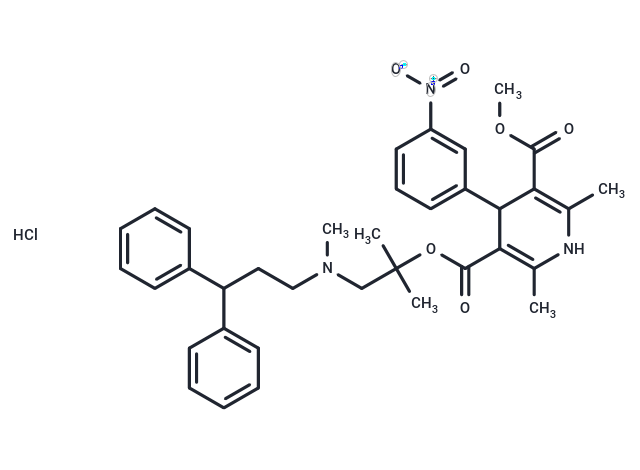Shopping Cart
- Remove All
 Your shopping cart is currently empty
Your shopping cart is currently empty

Lercanidipine hydrochloride (Corifeo) is a calcium channel blocker of the dihydropyridine class.

| Pack Size | Price | Availability | Quantity |
|---|---|---|---|
| 50 mg | $29 | In Stock | |
| 100 mg | $48 | In Stock | |
| 500 mg | $176 | In Stock | |
| 1 mL x 10 mM (in DMSO) | $48 | In Stock |
| Description | Lercanidipine hydrochloride (Corifeo) is a calcium channel blocker of the dihydropyridine class. |
| In vitro | In vitro calcium antagonistic activity of Lercanidipine is clearly related to a gradual block of calcium entry into smooth muscle cells via L-type calcium channels. lercanidipine inhibits cellular cholesteryl ester formation. At concentrations similar to those occurring in clinical practice, it may inhibit in vitro macrophage functions involved in atherogenesis and plaque stability[1]. |
| In vivo | In chronically catheterised dogs with experimental renovascular hypertension, lercanidipine decreases diastolic blood pressure in a dose-dependent manner (ED25 = 0.9 mg/kg p.o). In the same animals, long term application of lercanidipine showed permanent decrease of diastolic blood pressure indicating no tolerance of the antihypertensive effect[3]. Lercanidipine possesses significant anticonvulsant effect. It does not affect the muscle coordination or locomotor activity in mice[5]. In clinical studies, lercanidipine has a 24-hour antihypertensive effect and causes no significant increase in heart rate. Lercanidipine has been shown to be effective in a wide range of hypertensive patients, including mild-to-moderate hypertension, severe hypertension, the elderly, and those with isolated systolic hypertension. It is associated with a low rate of adverse events[4]. |
| Kinase Assay | Cell-free enzyme assays are performed to determine the selective inhibition of ROCK1 and ROCK2 by SLx-2119. Reactions are performed on non-binding surface microplates. Four mU of human ROCK1 and ROCK2 are used to phosphorylate 30 μM of the synthetic ROCK peptide substrate S6 Long, prepared at American Peptide with the addition of 10 μM ATP, containing?33P-ATP in the presence of 10 mM Mg2+, 50 mM Tris, pH 7.5, 0.1 mM EGTA and 1 mM DTT at room temperature. One unit is the amount of kinase needed to catalyze the transfer of 1 nmol phosphate/min to the peptide. The reactions are allowed to proceed for 45 minutes and then stopped with 3% phosphoric acid to a final concentration of 1%. The reactions are captured on phospho cellulose filtration microplates and washed with 75 mM phosphoric acid and methanol using a vacuum manifold. Phosphorylation is measured on a Perkin-Elmer MicroBeta 1450. |
| Cell Research | Cells are incubated for 24 hours in DMEM+EFAF 0.2% and lercanidipine, then with lercanidipine and AcLDL for 24 hours. In the last 2 hours [14C]-oleic acid albumin complex is added for the determination of cholesterol esterification (ACAT activity). (Only for Reference) |
| Alias | Corifeo, Carmen, Cardiovasc |
| Molecular Weight | 648.19 |
| Formula | C36H41N3O6·HCl |
| Cas No. | 132866-11-6 |
| Smiles | Cl.COC(=O)C1=C(C)NC(C)=C(C1c1cccc(c1)[N+]([O-])=O)C(=O)OC(C)(C)CN(C)CCC(c1ccccc1)c1ccccc1 |
| Relative Density. | no data available |
| Storage | Powder: -20°C for 3 years | In solvent: -80°C for 1 year | Shipping with blue ice. | |||||||||||||||||||||||||||||||||||
| Solubility Information | DMSO: 50 mg/mL (77.14 mM), Sonication is recommended. Ethanol: 6.5 mg/mL (10.03 mM), Sonication is recommended. | |||||||||||||||||||||||||||||||||||
Solution Preparation Table | ||||||||||||||||||||||||||||||||||||
Ethanol/DMSO
DMSO
| ||||||||||||||||||||||||||||||||||||

Copyright © 2015-2025 TargetMol Chemicals Inc. All Rights Reserved.